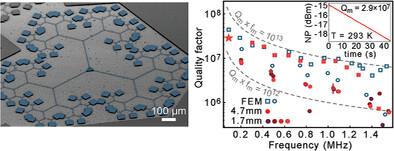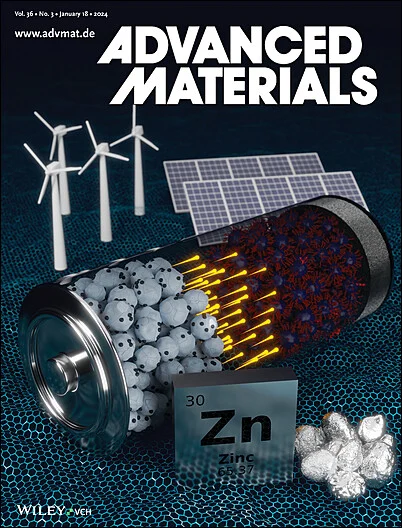Nanomechanical Crystalline AlN Resonators with High Quality Factors for Quantum Optoelectromechanics
IF 27.4
1区 材料科学
Q1 CHEMISTRY, MULTIDISCIPLINARY
引用次数: 0
Abstract
High-quality factor (Qm) mechanical resonators are crucial for applications where low noise and long coherence time are required, as mirror suspensions, quantum cavity optomechanical devices, or nanomechanical sensors. Tensile strain in the material enables the use of dissipation dilution and strain engineering techniques, which increase the mechanical quality factor. These techniques have been employed for high-Qm mechanical resonators made from amorphous materials and, recently, from crystalline materials such as InGaP, SiC, and Si. A strained crystalline film exhibiting substantial piezoelectricity expands the capability of high-Qm nanomechanical resonators to directly utilize electronic degrees of freedom. In this work, nanomechanical resonators with Qm up to 2.9 × 107 made from tensile-strained 290 nm-thick AlN are realized. AlN is an epitaxially-grown crystalline material offering strong piezoelectricity. Nanomechanical resonators that exploit dissipation dilution and strain engineering to reach a Qm × fm-product approaching 1013 Hz at room temperature are demonstrated. A novel resonator geometry is realized, triangline, whose shape follows the Al–N bonds and offers a central pad patterned with a photonic crystal. This allows to reach an optical reflectivity above 80% for efficient coupling to out-of-plane light. The presented results pave the way for quantum optoelectromechanical devices at room temperature based on tensile-strained AlN.

用于量子光机电的具有高品质因数的纳米机械晶体 AlN 谐振器
高品质因数(Qm)机械谐振器对于要求低噪声和长相干时间的应用至关重要,如镜面悬浮装置、量子腔光学机械装置或纳米机械传感器。材料中的拉伸应变可以利用耗散稀释和应变工程技术来提高机械品质因数。这些技术已被用于非晶材料制成的高 Qm 机械谐振器,最近还被用于 InGaP、SiC 和 Si 等晶体材料。表现出巨大压电性的应变晶体薄膜扩展了高 Qm 纳米机械谐振器直接利用电子自由度的能力。在这项研究中,利用拉伸应变 290 nm 厚的 AlN 实现了 Qm 高达 2.9 × 107 的纳米机械谐振器。AlN 是一种外延生长的晶体材料,具有很强的压电性。利用耗散稀释和应变工程的纳米机械谐振器在室温下达到了接近 1013 Hz 的 Qm × fm 值。实现了一种新颖的谐振器几何形状--三角线,其形状遵循 Al-N 键,并提供了一个光子晶体图案的中央垫。这样就能达到 80% 以上的光学反射率,从而实现与平面外光的高效耦合。这些成果为基于拉伸应变 AlN 的室温量子光机电设备铺平了道路。
本文章由计算机程序翻译,如有差异,请以英文原文为准。
求助全文
约1分钟内获得全文
求助全文
来源期刊

Advanced Materials
工程技术-材料科学:综合
CiteScore
43.00
自引率
4.10%
发文量
2182
审稿时长
2 months
期刊介绍:
Advanced Materials, one of the world's most prestigious journals and the foundation of the Advanced portfolio, is the home of choice for best-in-class materials science for more than 30 years. Following this fast-growing and interdisciplinary field, we are considering and publishing the most important discoveries on any and all materials from materials scientists, chemists, physicists, engineers as well as health and life scientists and bringing you the latest results and trends in modern materials-related research every week.
文献相关原料
| 公司名称 | 产品信息 | 采购帮参考价格 |
|---|
 求助内容:
求助内容: 应助结果提醒方式:
应助结果提醒方式:


